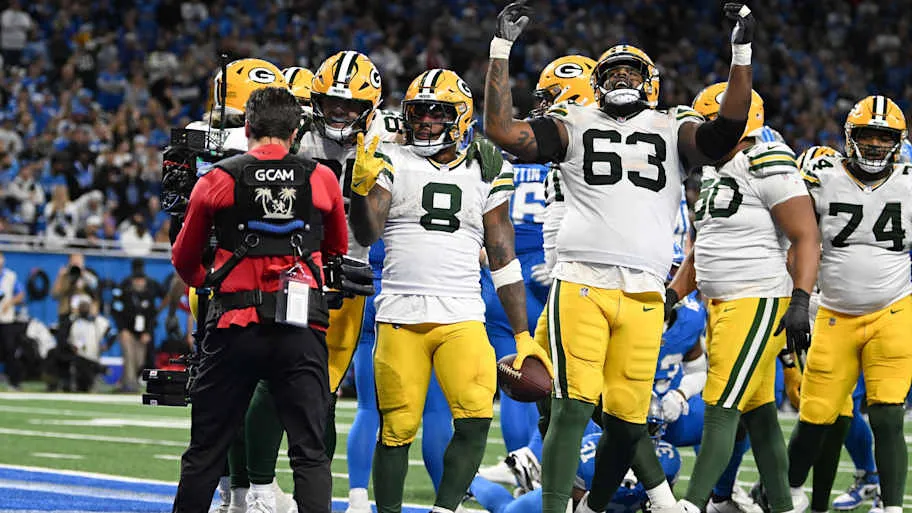Why Jayden Reed Wasn’t Targeted in Packers’ Loss to Lions
The Green Bay Packers suffered a tough 34-31 loss to the Detroit Lions on Thursday night. Amid the offensive struggles, one standout question emerged: why wasn’t Jayden Reed, one of the team’s most versatile and dynamic players, more involved in the game plan? With only one target and zero catches, Reed’s minimal contribution raised eyebrows […]

The Green Bay Packers suffered a tough 34-31 loss to the Detroit Lions on Thursday night. Amid the offensive struggles, one standout question emerged: why wasn’t Jayden Reed, one of the team’s most versatile and dynamic players, more involved in the game plan? With only one target and zero catches, Reed’s minimal contribution raised eyebrows among fans and analysts alike.
Low Offensive Play Count and Reed’s Lone Target
The Packers ran only 45 offensive plays, making it challenging to distribute opportunities across the roster. Reed’s sole target came in the first quarter on a short out route during a second-and-5 play at Detroit’s 47-yard line. Unfortunately, he dropped the pass, which his mom confirmed after reviewing the replay. “I asked my mom, and she said on the TV copy it was a drop,” Reed admitted. The play could have secured a first down and shifted the momentum early in the game, but the Packers ended up punting two plays later.
This drop was counted as Reed’s seventh of the season, tying him for the second-most drops in the league, according to ESPN Research.

Limited Snap Count Hinders Reed’s Impact
Reed played only 25 snaps against the Lions, significantly fewer than the 36 he logged in the previous game against Miami. This limited playing time has been part of a larger trend over the past four games, where Reed’s involvement has diminished despite his potential to influence the outcome.
Since his standout performance in Week 9 against the Lions, where he recorded five catches for 113 yards, Reed has managed only 73 yards on eight catches across four games. This drop in production is not entirely under his control. “A lot of that I can’t control,” Reed said. “It’s a team game. The blocking’s got to go right, a lot has to go right for things like that to happen.”
Coaching Decisions and Play Design
Packers head coach Matt LaFleur addressed Reed’s lack of involvement, explaining that the Lions’ defensive schemes influenced their offensive strategy. “We tried to go to him early in the game,” LaFleur said, citing plays that were designed for Reed but failed due to sacks and incomplete passes.
LaFleur added that the Lions’ defensive setup encouraged the Packers to lean on the run game, which further reduced opportunities for the passing attack. The use of two-tight-end personnel packages also contributed, as it typically replaces the slot receiver position, which Reed often plays.
Despite this, LaFleur acknowledged the need to better integrate Reed into the offense, even in situations where his usual position might not fit the scheme. “We can be better by making sure we have some plays for him in the game plan where he’s tagged to go in there and play wide out,” LaFleur said.
Reed’s Season Performance: A Bright Spot
Despite recent challenges, Jayden Reed remains a key player for the Packers. He leads the team in targets (59), catches (44), and receiving yards (693). Additionally, he has contributed six receiving touchdowns and one rushing touchdown, showcasing his versatility as a weapon both in the passing game and on designed runs.
Five times in the first nine games, Reed played at least two-thirds of the offensive snaps, including four games where he exceeded 71%. His early-season involvement highlighted his ability to make an impact, raising hopes for a return to a more significant role as the Packers head into the final stretch of the season.

Looking Ahead: Seahawks Showdown
As the Packers prepare for their Sunday night matchup against the Seattle Seahawks, Reed is unsure whether his involvement will increase. “Man, just keep controlling what I can control, keep being a good teammate,” Reed said. “Whether I am or not getting the ball, just keep cheering those guys and being there for them, coaching them up.”
With the Packers sitting at 9-4 and eyeing a strong finish to the season, maximizing Reed’s potential could be pivotal. His ability to stretch the field, make critical catches, and contribute in various ways offers the team a chance to boost its offensive efficiency in high-stakes games.
Conclusion
Jayden Reed’s limited role in the Packers’ loss to the Lions underscores the complexities of NFL game planning, where individual talent can be overshadowed by team strategy and external factors. While his single target and subsequent drop were disappointing, Reed remains a vital part of the Packers’ offense. Finding ways to involve him more consistently could make a significant difference as the team pushes toward the playoffs.













































